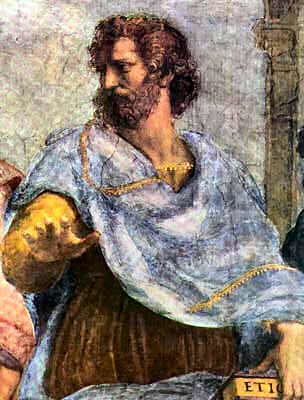
Aristotle: ‘Those who assert that the mathematical sciences say nothing of the beautiful or the good are in error. For these sciences say and prove a great deal about them; if they do not expressly mention them, but prove attributes which are their results or definitions, it is not true that they tell us nothing about them. The chief forms of beauty are order and symmetry and definiteness, which the mathematical sciences demonstrate in a special degree.’
We’re told that for beauty and romanticism we must look to the unreal and the impossible. But the actualization of achievement and advancement in life are what really bring beauty. In other words: Science, productivity, achievement, accomplishment’these are what bring beauty.
The pretentious who still rule us (in mind, body, or both) insist that beauty is found in nature, as far away from human capacity and accomplishment as you can go. A wild animal in a jungle? That’s beauty, claim those who would not last five minutes alone in that jungle. A skyscraper, a computer microchip, a cure for an illness? Those are merely secular things, and therefore are secondary. Only things found in nature are what matter, they claim. Yet Aristotle—all those centuries ago—understood that real beauty was to be found in what made human life successful and progressive (in the actual sense of that term). He may have lived thousands of years ago, but he makes today’s self-proclaimed ‘philosophers’ seem trivial by comparison.
Aristotle: ‘May not we then confidently pronounce that man happy who realizes complete goodness in action, and is adequately furnished with external goods? Or should we add, that he must also be destined to go on living not for any casual period but throughout a complete lifetime in the same manner, and to die accordingly, because the future is hidden from us, and we conceive happiness as an end, something utterly and absolutely final and complete? If this is so, we shall pronounce those of the living who possess and are destined to go on possessing the good things we have specified to be supremely blessed, though on the human scale of bliss.’
Aristotle understood that it’s the human scale of bliss that counts; not fantasized or imagined states of bliss applying to some other dimension of reality.
Aristotle: ‘For pleasure is a state of soul, and to each man that which he is said to be a lover of is pleasant…. Now for most men their pleasures are in conflict with one another because these are not by nature pleasant, but the lovers of what is noble find pleasant the things that are by nature pleasant; and virtuous actions are such… Happiness then is the best, noblest, and most pleasant thing in the world, and these attributes are not severed as in the inscription at Delos: Most noble is that which is justest, and best is health; but pleasantest is it to win what we love.’
Happiness is the standard of the good. What rationally and truly, objectively brings happiness to human life should be our measure of ethics. What other standard could there possibly be?
Aristotle: ‘If … we state the function of man to be a certain kind of life, and this to be an activity or actions of the soul implying a rational principle, and the function of a good man to be the good and noble performance of these, and if any action is well performed when it is performed in accordance with the appropriate excellence … human good turns out to be activity of the soul in accordance with virtue, and if there are more than one virtue, in accordance with the best and most complete.’
The ‘soul’ is usually considered something mystical, bordering on the impossible or the unreal. But Aristotle grasped that the ‘soul’ is simply human consciousness—merged with purposeful action—that creates greatness, goodness, and excellence. ‘Activity of the soul in accordance with virtue.’ All he’s saying here is: ‘Use your mind and act on the knowledge of your mind, and that will give you goodness.’ That’s what science, business and all the things that make human life worthwhile comprise.
Many philosophers and ‘spiritualists’ have come and gone since Aristotle’s time (384-322 BC). But few have really figured out what the whole purpose of life really is. In fact, there’s no mystery. The purpose of life is to make your own life purposeful, efficacious and worth remembering.
Aristotle was the most modern of ancients.
Be sure to “friend” Dr. Hurd on Facebook. Search under “Michael Hurd” (Rehoboth Beach DE). Get up-to-the-minute postings, recommended articles and links, and engage in back-and-forth discussion with Dr. Hurd on topics of interest.
